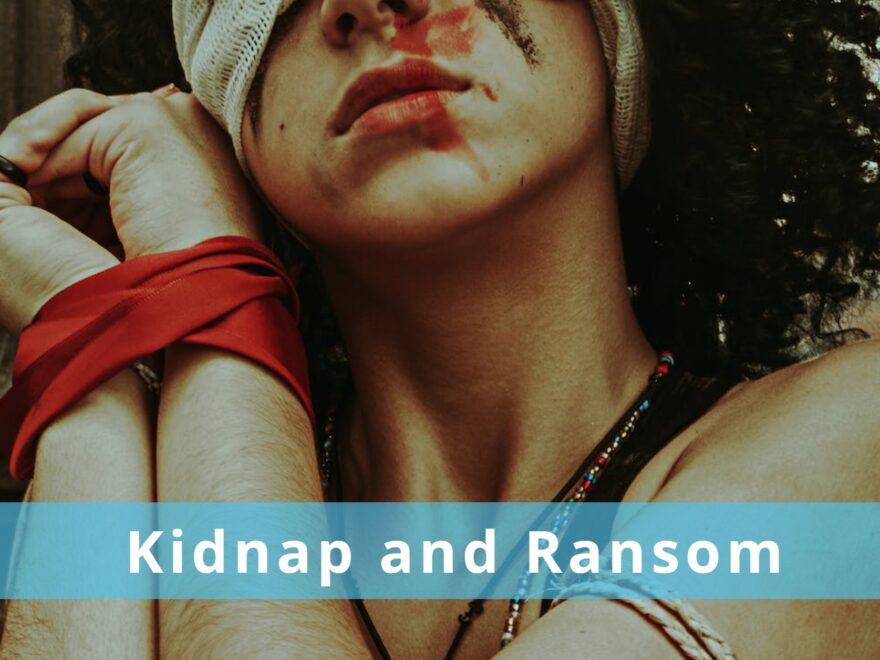Kidnap and Ransom are relatively common in the developing world, and a market for kidnap insurance has emerged in response.
Discovering that the market for kidnap insurance can be sustained because it benefits a risk-averse family, as long as the introduction of insurance does not significantly increase the risk of kidnapping.
Families should fully insure if it does not increase the likelihood of kidnapping, and only partially insure otherwise.
Kidnapping insurance allows families to reclaim hostages from kidnappers who are more willing to kill, which may reduce the number of kidnapping fatalities as long as the insurance does not significantly increase the risk of kidnapping.
this article covers ways kidnapping occurs, and will learn the meaning of kidnap and ransom the following individuals that need to get insured when kidnapped, and also the cost of kidnapping insurance.
Explore on Fire insurance: meaning, procedure and 5 principles of fire insurance
What is kidnapping?
Kidnapping is broadly defined as moving another person a significant distance by force or fear without the consent of the other person.
Meanwhile, Aggravated kidnapping is defined as kidnapping with serious bodily harm to the victim, or a ransom demanded, carjacking, fraud, force, or fear on a victim under the age of 14.
Ways Kidnapping Can Occur
Kidnapping for ransom is a persistent problem around the world because it can be a very profitable business for those who commit these crimes.
Kidnap and ransom insurance, also known as K&R insurance, is intended to protect individuals and businesses operating in high-risk areas around the world. Mexico, Venezuela, Haiti, and Nigeria, as well as other Latin American countries and parts of the Russian Federation and Eastern Europe, are frequently mentioned in policies. In Central Asia, the number of incidents is also increasing, particularly in Afghanistan and Iraq.
Kidnap and ransom insurance is intended to help protect your organization from the financial impact of sudden and unexpected expenses related to kidnapping, extortion, ransom, or illegal detention. There are four ways Kidnapping can occur and these four ways are common;
- kidnapping that results in serious bodily harm or death for the victim
- kidnapping with a demand for a ransom
- kidnapping occurring concurrently with a carjacking
- kidnapping is motivated by deception, coercion, or fear of the victim.
You can also see The Liability Implications of BYOD – and the Insurance You May Need
What Does Kidnap And Ransom Insurance Mean?
Kidnap and ransom insurance are insurance policies that typically cover monies paid to kidnappers or extortionists, ransom loss in transit, and other expenses incurred as a result of a kidnapping.

They can also be called financial institutions that provide protection financially and also manage crises caused by kidnap, hijack, and extortion.
These dangers are very real and may not just affect one’s personal life they can also strike any business. Someone may hold a grudge against you, your business, or your employees. Someone may even try to coerce you into disclosing company trade secrets.
Even if no ransom is paid, stressful situations can result in unexpected costs and have a significant impact on your company’s bottom line.
Who is the set of people that need This Coverage?
If you frequently travel to any of the countries listed above, you should think about getting kidnap and ransom coverage.
Kidnap & Ransom Insurance is Appropriate for Individuals, businesses, and organizations operating in high-risk locations, as well as those with workers or family members, who often go to such places, who should consider purchasing Kidnap and Ransom Insurance.
Wealthy businesspeople and their families, professionals traveling abroad, tourists, journalists, and aid workers are the primary targets. But now both the masses and the wealthy even they have all become a victim of this incident.
Companies frequently use it when their employees travel to areas where kidnapping is a problem. Kidnap and Ransom insurance can cover spouses, relatives, guests, nannies, housekeepers, or just a single person.
Individuals can also purchase kidnap and ransom insurance on their own. However, due to the high cost of these policies, the majority of those who purchase them are wealthy or well-known.
Kidnap and ransom insurance are more likely to be purchased by celebrities, famous musicians, sports stars, and politicians.
Furthermore, these policies are frequently purchased by nongovernmental organizations (NGOs), universities with international programs, and other institutions. If their employees, volunteers, or students are harmed, such organizations may face legal action.
What Kidnap Insurance Covers?
It is also important that Kidnap and Ransom insurance, like other types of insurance, covers losses caused by injuries, related cosmetic surgery expenses, time off work after release, travel expenses, and reward money paid to informants.
Extortion, terrorism, and wrongful detention can all result in compensation. Kidnap and ransom insurance may also cover funeral expenses in the worst-case scenario.
It should be noted that just because you have kidnap and ransom insurance doesn’t make it flaunt and expose yourself to the danger of being kidnapped and such action may void your policy.
How does This Insurance Work?
In the majority of kidnapping cases, the perpetrators demand that the victims not notify any other parties.
This can be difficult, resulting in complications when the employer or family must contact the insurance company. As a result, many kidnap and ransom policies include a notification provision. It states that the policyholder, employer, or family should only report a kidnapping to the insurer and the police when it is safe to do so.
When contacted, the insurer immediately goes into action, dispatching specialists to aid in the release of the kidnapped person. Negotiations with the kidnappers, delivery of a ransom, evacuation, and appropriate care are all part of this assistance.
However, the insurer does not pay the ransom directly. Instead, the employer or family must pay for it out of pocket or obtain a loan.
It should be noted that the majority of kidnap and ransom policies cover the interest on money borrowed for this purpose. When the crisis is over, the insurer will reimburse the policyholder for the ransom and any associated costs. If total costs exceed a certain threshold, the policyholder is responsible for covering the additional costs.
The Cost of Kidnap and Ransom Insurance
Research from Investopedia shows that some policies start as low as $500 per year, but the cost quickly escalates.
It is determined by the type of coverage, the number of benefits, the destination countries, and the number of people covered. A $5 million policy that covers a year of nonhazardous travel could cost around $2,000 in total.
We have also written on How Much Does Cyber Insurance Cost?
While for Kidnap And Ransom Insurance, the amount you pay for coverage depends on several factors which are Travel locations, industry, and business model, Your international trip frequency and duration, Employees’ number, and the Coverage you choose.
Traveling to countries where kidnappings have occurred in the past or where there is political unrest will result in higher premiums.
According to A.J. Gallagher, an insurance broker, if your company has limited foreign exposure, you could pay as little as $400 per $1 million of coverage. If your company is more exposed (has more travel and locations), you’ll pay more: typically $1,000 to $3,000 per $1 million of coverage.
What Expenses does it Cover?
Many Kidnap and ransom policies cover the ransom amount, as well as a variety of related expenses, as well as crisis management and security services.
Insurance companies can set different limits and retentions (similar to deductibles) for different types of coverage, which are;
Ransom Amount
The value of money, securities, or other property surrendered to satisfy a ransom or extortion demand is covered by kidnap and ransom policies. They may even cover ransom money (or other property) lost or stolen while being transported to kidnappers or extortionists.
Associated Costs
There are numerous expenses that could be incurred during or as a result of an incident. Depending on the policy, the following may be covered:
- The interest on a loan taken out to pay a ransom
- Independent negotiators’, public relations consultants’, interpreters’, and forensic analysts’ fees
- Cost of a reward paid to an informant for information that helps secure the release of a kidnap, detention, or hijack victim
- The cost of necessary medical or psychiatric treatment for a victim of kidnapping, detention, or hijacking.
- Costs must be incurred within a certain time frame (for example, 36 months) after the victim’s release.
- The cost of employing security guards to protect the insured individual
- Salary, bonus, and other compensation paid to the victim during the kidnapping, detention, or hijacking, as well as for a period of time (such as 45 days) after their release
- Transportation costs for the victim and his or her family members from the scene of the incident to the victim’s home country or place of residence.
- A benefit if an insured person dies or sustains a specific type of injury, such as loss of a limb or loss of sight
- Damages, settlements, court costs, and attorneys’ fees incurred as a result of a negligence suit filed against your company by an insured person or his or her heirs.
Security and crisis management.
Many kidnap and ransom policies cover crisis management services because business owners would never be expected to know how to deal with kidnappers and extortionists. The insurer hires a third party to provide these services.
The perpetrators of most kidnappings demand that no other parties be notified. This can be especially difficult, leading to complications when the family or employer needs to contact the insurance provider.
As a result, many kidnap and ransom policies include a provision requiring the policyholder, family, or employer to notify the insurer and authorities about a kidnapping only when it is safe to do so.
Conclusion
Kidnap and ransom insurance plans often cover funds given to kidnappers or extortionists, loss of ransom in transit, and other expenditures incurred as a result of an abduction. These hazards are quite serious and may happen to any firm.
if you travel a lot to places that are not safe or feel the need to get an insurance policy for kidnap, all you need to do is to contact your insurance brokers to help you find the best policy that suits you in cases where the needs might arise.
Additional resources
The Top 10 Body Parts Insurance That Americans Want to Insure the Most
What exactly are bond Insurance and its advantages
